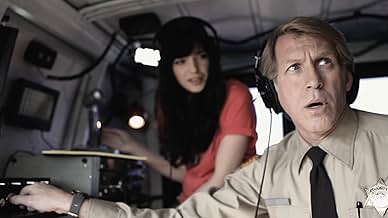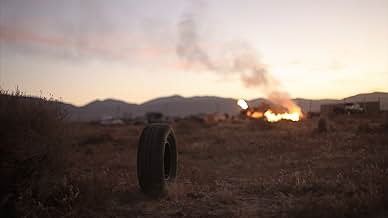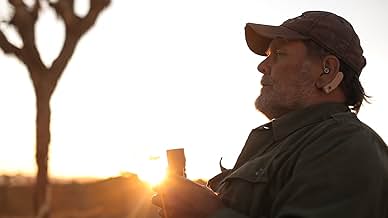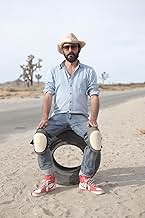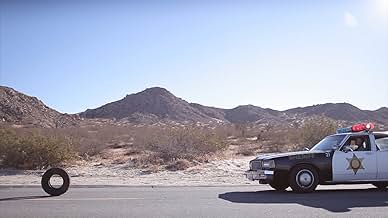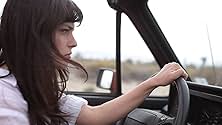A homicidal car tire, discovering it has destructive psionic power, sets its sights on a desert town once a mysterious woman becomes its obsession.A homicidal car tire, discovering it has destructive psionic power, sets its sights on a desert town once a mysterious woman becomes its obsession.A homicidal car tire, discovering it has destructive psionic power, sets its sights on a desert town once a mysterious woman becomes its obsession.
- Awards
- 5 wins & 3 nominations total
- Black Woman
- (as Cecilia Antoinette)
- Zach
- (as Remi Thorne)
- Cleaning Lady
- (as Tara O'Brien)
- Cop Luke
- (as Pete Di Cecco)
- Cop Denise
- (as Courtenay K. Taylor)
- Director
- Writer
- All cast & crew
- Production, box office & more at IMDbPro
Featured reviews
4.5/10
One could claim, of course, that writer/director Quintin Dupieux' approach is innovative, courageous and humorous. This is true, in fact, but sadly just for a very brief period. The first few images of a seemingly half-drunken tire rolling through the sand and causing cute little bunny rabbits to explode are undeniably hilarious (if you share the same twisted sense of humor, that is) but it becomes dull and derivative enormously fast. The "no reason" gimmick quickly loses its panache and general fun-factor. Okay, so there's a psychopathic tire on a rampage and it doesn't make any sense. We would have understand that after five exploding heads instead of fifty as well. If "Rubber" had been a short feature, it would have been equally effective. Perhaps even more. Also, and this might be a purely personal opinion, I don't really like it when director hide themselves behind the randomness excuse. Everyone can think up a story that makes absolutely no sense. It's too easy like that. Obviously I think there are several good things to enjoy about "Rubber" as well, otherwise I wouldn't have given the average rating. The desolate filming locations and complementary references towards older movies are fun to spot. It was also tremendously cool to see former B-movie star Wings Hauser ("Night Shadows", "Vice Squad") in a prominent role again after so long. The special effects and make-up art look adorably cheesy and the electro/experimental soundtrack is quite awesome. The latter quality shouldn't come too much as a surprise, since writer/director Quintin Dupieux is primarily known as a musician and scored a humongous hit in the late 1990's as Mr. Oizo with "Flat Beat".
Yet soon I realized that this film was so much more than horror spoof or a silly gimmick film. The movie opens with a desert road randomly strewn with simple wooden parsonage chairs facing in all directions. Next a car appears and begins deliberately swerving into the chairs, breaking each one of them, until it comes to a halt. At that point, a sheriff emerges (from out of the trunk?!) and knocks on the driver door where he is handed a full glass of water. The sheriff breaks the fourth wall and begins addressing the audience by speaking of the "no reason" principle of famous movies like E.T., Love Story and Texas Chainsaw Massacre. This narration immediately reminded me of the criminologist from Rocky Horror Picture Show, and I suddenly did not know what to expect from this movie.
I honestly think the less said about this film the better. Suffice it to say that Rubber is one part B-movie schlock, one part David Lynch, and one part Hitchcock. (Did I just actually go there?) On my first watching of the movie, I appreciated its style. The camera angles, the homage to Psycho, the riveting and unnerving sound track were somehow quite effective in producing suspense. Quite remarkable when the serial tire is a generic tire! Juxtaposed against this atmospheric cinematography was a very healthy dose of absurdity and dark humor. This makes for an extremely interesting viewing experience, where the audience switches abruptly from anticipation to laughter to abject confusion.
The sheriff tells us that there is "no reason" for this film. What a deceit! Because there is a reason for virtually everything – from the opening scene of the destruction of chairs, to the irony of a Nascar race, to the well placed remake of the song "Just Don't Want to be Lonely" to (yes!) the turkey. Irony abounds even as our in character heroine proclaims that she cannot read the lines of dialog because they are garbage.
The second time I watched this movie, I focused on its true theme. I realized with delight that the movie is about movies and their audiences. Pay very close attention to every scene with the bystanders on the road and you will realize that the killer tire story is not the actual plot at all. Also, on second viewing, you can revel in the brilliant personification of the killer tire (Robert). A tire that learns, sleeps, recreates, dreams, and even has flashbacks to his previous inanimate incarnation on an actual car. Observe the film structure and use of the reflecting glass and incineration scene as key catalysts. You will be amazed at all you missed when first watching this movie.
Astonishingly, this became my favorite movie of 2011 so far. Lovers of film should not miss this.
The film opens with some surreal imagery, some utter nonsense, and then the lines that explain everything you will see for the next hour: the "no reason" speech. Why do things happen in movies? As they say, sometimes for no reason (Why is ET brown?) This film takes that principle to the next level.
With a tire being the main character, not many actors get enough screen time to really develop their roles. I would have liked to see more of Haley Ramm. I did not know her, despite her lengthy resume (she was young Jean Grey, for example)... I would like to see her in more things, get more starring roles. Perhaps in "Red State"?
Rubber is a "horror" film about a black rubber car tyre that kills people by making their heads explode. With telepathy. And when I say "horror" I do of course mean "side-splittingly funny, pitch black, absurdist comedy." The opening scenes of Rubber are a deliberate assault on the separation between the audience and the film. Normally the opening sequence of a film seeks to bring you into the world of the film; the audience is encouraged to step through the silver screen and forget about the real world for the duration of the story. Rubber perverts these expectations. The film comes crashing through the screen, into the world of the audience. It reminds us at every turn that we are watching a film, and indeed that the very act of our watching is what makes the film happen.
There are actually two plot lines at work in Rubber. The first concerns a murderous inanimate object , an innocent but spirited young woman on the run from some troubled element of her past, and the county sheriff on the trail of the vulcanised psychopath. This is ostensibly the core thread of the movie, but we soon see that this action only serves as a literal distraction for the audience, who exist in the film, embodied as actual participants, though ones who remain clearly and distinctly removed from the action, watching events at a distance through field glasses. This distraction covers the real story, that of the sheriff, who is in fact the antagonist of the story, attempting to kill off the audience (through the manoeuvrings of his toady, The Accountant) so that the film can end and he can go home.
The movie within the movie begins with a sequence that could have come straight from Leone's scrapbook. A man lies face down in a desert. Slowly, he rises, and shakes himself off. He staggers along, and falls. He rises again, and continues to stagger on, through the endless desert. Except that the "man" in question is a rubber tyre (Roger, according to the credits). This is the brilliance of Rubber; that it can appropriate the cinematic language that we are so familiar with, and apply it to situations that cannot be anything but utterly absurd.
Other scenes lift from a variety of sources, including a sequence that takes place in what is clearly the Bates hotel from the original Psycho. For a film that claims to be dedicated to meaninglessness, it is ironic that not a single frame is without a clear purpose. Every shot serves to either ensconce us in the impossible world of a rubber tyre who murders people, or tear us forcibly out of it, as we return repeatedly to the plight of the poor audience, stranded in the desert with no food, and prey to depredations of a murderous cast member, or possibly character. It's never clear whether the antagonist is an actor who wants to stop playing his role, or a character in a story who wants the story itself to end; the latter appeals, if only for its deeply apocalyptic subtext. When the film ends, where does the character go?).
Even the choice of the supposed villain must have taken a great deal of thought. It's such an elegant choice; an object capable of locomotion, but without moving parts to cutely animate. Something that has an element of menace (after all, a tyre, attached to a vehicle, can do a lot of damage), but is also innately ridiculous. An object that can fulfill the emotive needs of the film yet has remarkably little capacity to emote. Consider that all this thing can do is roll forward, roll backwards, fall over, stand up, and vibrate its sides. That's a sum total of five things you can ask your star to do for you on screen. As a film-making challenge alone, that's a spectacular feat to undertake.
I could go on for days about the tiniest of "seemingly irrelevant but incredibly well thought out" details that litter the film. That Rubber invites such complex readings is a testament to the subtlety that underlies the simple brilliance of the film itself. Whatever you may think about the subtext and meaning of this supposedly meaningless film, it doesn't really matter if Rubber "means" anything or not, because whatever else it may be, the film is absolutely hilarious. We are talking literal "tears of laughter" funny here.
Quentin Dupieux provides us with excellent cinematography, full of lingering establishing shots and vivid, often deliberately off-frame close-ups, and the cast all turn in magnificent performances, especially Jack Plotnick, who demonstrates the ability to carry a scene from laugh out loud funny to deeply uncomfortable in a matter of seconds. The script is tightly written, and the humour builds on itself in layers, rising from the initial "WTF?" moments of nervous laughter to the farcical crescendo of the closing scenes, where every element of the film collides in a scene that, if nothing else, will mean that I'll never look at tricycles the same way again.
I could continue to pick at Rubber, pulling out detail after detail, examining each one in turn to find new facets, new thoughts and revelations. None of that really matters though; what you need to know is that Rubber is the strangest, funniest, and most dazzlingly original film you will see this year, and considering that Scott Pilgrim vs The World just came out, that's one hell of an achievement.
Originally from http://www.rgbfilter.com/?p=9032
Did you know
- TriviaMade mostly with practical special effects - very little CGI was used.
- GoofsWhen the tire is watching Nascar on the TV, the sound we hear is from a different series of motor-racing; possibly Formula 1.
- Quotes
[first lines]
Lieutenant Chad: In the Steven Spielberg movie "E.T.," why is the alien brown? No reason. In "Love Story," why do the two characters fall madly in love with each other? No reason. In Oliver Stone's "JFK," why is the President suddenly assassinated by some stranger? No reason. In the excellent "Chain Saw Massacre" by Tobe Hooper, why don't we ever see the characters go to the bathroom or wash their hands like people do in real life? Absolutely no reason. Worse, in "The Pianist" by Polanski, how come this guy has to hide and live like a bum when he plays the piano so well? Once again the answer is, no reason. I could go on for hours with more examples. The list is endless. You probably never gave it a thought, but all great films, without exception, contain an important element of no reason. And you know why? Because life itself is filled with no reason. Why can't we see the air all around us? No reason. Why are we always thinking? No reason. Why do some people love sausages and other people hate sausages? No fuckin' reason.
Cop Xavier: [honks the horn] Come on! Don't waste your time explaining that garbage. Let's go!
Lieutenant Chad: Just a minute. Let me finish.
[looks back at the audience]
Lieutenant Chad: Ladies, gentlemen, the film you are about to see today is an homage to the "no reason" - that most powerful element of style.
[pours his glass of water on the ground before getting back into the trunk of the police car]
- Crazy creditsDuring the closing credits, the opening monologue by Lt. Chad is shown from a different angle that shows the speech is for the "in-film" audience, and not the "theater" film audience.
- ConnectionsFeatured in Trailer Failure: Rubber, Madea, Shotgun (2011)
- SoundtracksJust Don't Want To Be Lonely
Lyrics and music by Vinnie Barrett, John C Jr Freeman and Bobby Eli
Performed by Blue Magic
- How long is Rubber?Powered by Alexa
Details
- Release date
- Country of origin
- Official site
- Language
- Also known as
- Rubber: La llanta asesina
- Filming locations
- Four Aces Movie Ranch - 14499 E Ave Q, Palmdale, California, USA(Sheila's car stalled, tire bumped by pickup truck)
- Production companies
- See more company credits at IMDbPro
Box office
- Budget
- $500,000 (estimated)
- Gross US & Canada
- $100,370
- Opening weekend US & Canada
- $16,346
- Apr 3, 2011
- Gross worldwide
- $101,729
- Runtime1 hour 22 minutes
- Color
- Sound mix
- Aspect ratio
- 1.85 : 1
Contribute to this page



